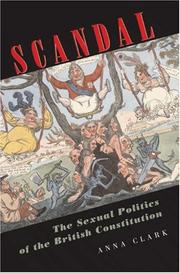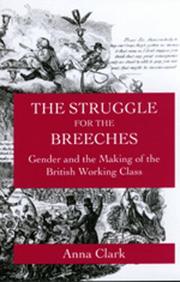| Listing 1 - 10 of 30 | << page >> |
Sort by
|
Book
ISBN: 9780415781398 0415781396 9780415781404 041578140X Year: 2011 Volume: *2 Publisher: London ; New York : Routledge,
Abstract | Keywords | Export | Availability | Bookmark
 Loading...
Loading...Choose an application
- Reference Manager
- EndNote
- RefWorks (Direct export to RefWorks)
Sex --- Sex customs --- History. --- Social aspects --- Europe --- Social life and customs. --- History --- Vie sexuelle --- --History. --- Histoire --- Aspect social --- Moeurs et coutumes --- --Europe
Book
ISBN: 9780415775182 9780415775175 0415775183 0415775175 Year: 2008 Publisher: New York, N.Y. Routledge, Taylor & Francis Group
Abstract | Keywords | Export | Availability | Bookmark
 Loading...
Loading...Choose an application
- Reference Manager
- EndNote
- RefWorks (Direct export to RefWorks)
Desire: A History of European Sexuality is a sweeping survey of sexuality in Europe from the Greeks to the present day. It traces two concepts of sexual desire that have competed in European history: desire as dangerous, polluting, and disorderly; and desire as creative, transcendent, even revolutionary. This book follows these changing attitudes toward sexuality through the major turning points of European history. The book ends by demonstrating that western European sexual culture is quite distinct from many other cultures, as the Christian hostility to sexual desire has lost influence. At the same time, the vision of sexual desire as revolutionary seems to have faded. Written in a lively and engaging style the book contains many fascinating anecdotes drawing on a rich array of sources including poetry, novels, pornography and film as well as court records, autobiographies and personal letters. While Anna Clark builds on the work of dozens of historians, she also takes a fresh approach and introduces the concepts of twilight moments and sexual economies. Desire integrates the history of heterosexuality with same-sex desire, and focuses on the emotions of love as well as the passions of lust, the politics of sex as well as the personal experiences.
Sex --- Sex customs --- Desire --- Sexualité --- Vie sexuelle --- Désir --- History. --- Social aspects. --- Histoire --- Aspect social --- History --- Social aspects --- Sexualité --- Désir --- History of Europe --- History of civilization --- Gender (Sex) --- Human beings --- Human sexuality --- Sex (Gender) --- Sexual behavior --- Sexual practices --- Sexuality --- Sexology --- Customs, Sex --- Manners and customs --- Moral conditions --- Appetency --- Longing --- Emotions --- Craving --- Yearning --- Sex - Europe - History --- Sex customs - Europe - History --- Desire - Social aspects --- Norms --- Government --- Religion --- Attitudes --- Book --- Culture

ISBN: 086358103X Year: 1987 Publisher: London Pandora
Abstract | Keywords | Export | Availability | Bookmark
 Loading...
Loading...Choose an application
- Reference Manager
- EndNote
- RefWorks (Direct export to RefWorks)
Book
ISBN: 1854890751 Year: 1995 Publisher: London Rivers Oram
Abstract | Keywords | Export | Availability | Bookmark
 Loading...
Loading...Choose an application
- Reference Manager
- EndNote
- RefWorks (Direct export to RefWorks)

ISBN: 069111501X 9780691115016 0691126011 1400849543 1306046165 9780691126012 9781400849543 Year: 2004 Publisher: Princeton, N.J. Princeton University Press
Abstract | Keywords | Export | Availability | Bookmark
 Loading...
Loading...Choose an application
- Reference Manager
- EndNote
- RefWorks (Direct export to RefWorks)
Are sex scandals simply trivial distractions from serious issues or can they help democratize politics? In 1820, George IV's "royal gambols" with his mistresses endangered the Old Oak of the constitution. When he tried to divorce Queen Caroline for adultery, the resulting scandal enabled activists to overcome state censorship and revitalize reform. Looking at six major British scandals between 1763 and 1820, this book demonstrates that scandals brought people into politics because they evoked familiar stories of sex and betrayal. In vibrant prose woven with vivid character sketches and illustrations, Anna Clark explains that activists used these stories to illustrate constitutional issues concerning the Crown, Parliament, and public opinion. Clark argues that sex scandals grew out of the tension between aristocratic patronage and efficiency in government. For instance, in 1809 Mary Ann Clarke testified that she took bribes to persuade her royal lover, the army's commander-in-chief, to promote officers, buy government offices, and sway votes. Could women overcome scandals to participate in politics? This book also explains the real reason why the glamorous Georgiana, Duchess of Devonshire, became so controversial for campaigning in a 1784 election. Sex scandal also discredited Mary Wollstonecraft, one of the first feminists, after her death. Why do some scandals change politics while others fizzle? Edmund Burke tried to stir up scandal about the British empire in India, but his lurid, sexual language led many to think he was insane. A unique blend of the history of sexuality and women's history with political and constitutional history, Scandal opens a revealing new window onto some of the greatest sex scandals of the past. In doing so, it allows us to more fully appreciate the sometimes shocking ways democracy has become what it is today.
Constitutional history --- Political corruption --- Sex scandals --- Sex --- History --- Political aspects --- Great Britain --- Politics and government --- Boss rule --- Corruption (in politics) --- Graft in politics --- Malversation --- Political scandals --- Gender (Sex) --- Human sexuality --- Sex (Gender) --- Sexuality --- Scandals --- Politics, Practical --- Corruption --- Misconduct in office --- Human beings --- Sexual behavior --- Sexual practices --- Sexology --- Corrupt practices --- Public law. Constitutional law --- History of the United Kingdom and Ireland --- anno 1700-1799 --- anno 1800-1899 --- Corruption (Politique) --- Scandales --- Histoire constitutionnelle --- Histoire --- Grande-Bretagne --- Politique et gouvernement
Book
ISBN: 9780815352501 0815352506 9780815352525 0815352522 9781351139168 1351139169 9780203723678 0203723678 9781351139144 1351139142 9781351139137 1351139134 9781351139151 1351139150 9780415775182 Year: 2019 Publisher: Abingdon, Oxon ; New York, NY : Routledge,
Abstract | Keywords | Export | Availability | Bookmark
 Loading...
Loading...Choose an application
- Reference Manager
- EndNote
- RefWorks (Direct export to RefWorks)
A sweeping survey of sexuality in Europe from the Greeks to the present, Desire: A History of European Sexuality follows changing attitudes to two major concepts of sexual desire – desire as dangerous, polluting, and disorderly, and desire as creative, transcendent, even revolutionary – through the major turning points of European history.Chronological in structure, and wide ranging in scope, Desire addresses such topics as sex in ancient Judaism, Christianity, and Islam, sexual contact and culture clash in Spain and colonial Mesoamerica, new attitudes toward sexuality in the seventeenth and eighteenth centuries, and sex in Bolshevik Russia and Nazi Germany. The book introduces the concept of "twilight moments" to describe activities seen as shameful or dishonorable, but which were tolerated when concealed by shadows, and integrates the history of heterosexuality with same-sex desire, as well as exploring the emotions of love and lust as well as the politics of sex and personal experiences. This new edition has been updated to include a new chapter on sex and imperialism and expanded discussions of Islam and trans issues.Drawing on a rich array of sources, including poetry, novels, pornography, and film, as well as court records, autobiographies, and personal letters, and written in a lively, engaging style, Desire remains an essential resource for scholars and students of the history of European sexuality, as well as women’s and gender history, social and cultural history and LGBTQ history.
Sex --- Sex customs --- Desire --- Sex. --- Sex customs. --- History. --- Social aspects. --- Europe.

ISBN: 052091905X 0585339635 9780520919051 0520086244 9780520086241 9780585339634 0520208838 9780520208834 Year: 1995 Volume: 23 Publisher: London University of California Press
Abstract | Keywords | Export | Availability | Bookmark
 Loading...
Loading...Choose an application
- Reference Manager
- EndNote
- RefWorks (Direct export to RefWorks)
Linking the personal and the political, Anna Clark depicts the making of the working class in Britain as a "struggle for the breeches." The late eighteenth and early nineteenth centuries witnessed significant changes in notions of masculinity and femininity, the sexual division of labor, and sexual mores, changes that were intimately intertwined with class politics. By integrating gender into the analysis of class formation, Clark transforms the traditional narrative of working-class history.
Working class --- Sex role --- Gender role --- Sex (Psychology) --- Sex differences (Psychology) --- Social role --- Gender expression --- Sexism --- History. --- Great Britain --- Social conditions --- History --- Gender roles --- Gendered role --- Gendered roles --- Role, Gender --- Role, Gendered --- Role, Sex --- Roles, Gender --- Roles, Gendered --- Roles, Sex --- Sex roles
Book
ISBN: 135003066X 1350030643 1350030635 1350118893 Year: 2017 Publisher: [New York] : Bloomsbury Academic,
Abstract | Keywords | Export | Availability | Bookmark
 Loading...
Loading...Choose an application
- Reference Manager
- EndNote
- RefWorks (Direct export to RefWorks)
"Alternative Histories of the Self investigates how people re-imagined the idea of the unique self in the period from 1762 to 1917. Some used the notion of the unique self to justify their gender and sexual transgression, but others rejected the notion of the unique self and instead demanded the sacrifice of the self for the good of society. The substantial introductory chapter places these themes in the cultural context of the long nineteenth century, but the book as a whole represents an alternative method for studying the self. Instead of focusing on the thoughts of great thinkers, this book explores how five unusual individuals twisted conventional ideas of the self as they interpreted their own lives. These subjects include: *The Chevalier d'Eon, a renegade diplomat who was outed as a woman *Anne Lister, who wrote coded diaries about her attraction to women *Richard Johnson, who secretly criticized the empire that he served *James Hinton, a Victorian doctor who publicly advocated philanthropy and privately supported polygamy *Edith Ellis, a socialist lesbian who celebrated the 'abnormal'. These five case studies are skilfully used to explore how the notion of the unique individual was used to make sense of sexual or gender non-conformity. Yet this queer reading will go beyond same-sex desire to analyse the issue of secrets and privacy; for instance, what stigma did men who practiced or advocated unconventional relationships with women incur? Finally, Clark ties these unusual lives to the wider questions of ethics and social justice: did those who questioned sexual conventions challenge political traditions as well?"--Bloomsbury Publishing.
Self. --- Sex and history. --- History and sex --- History --- Personal identity --- Consciousness --- Individuality --- Mind and body --- Personality --- Thought and thinking --- Will
Book
ISBN: 1597406945 9781597406949 Year: 1987 Publisher: Londres: Pandora press,
Abstract | Keywords | Export | Availability | Bookmark
Book
Year: 2011 Publisher: London Routledge
Abstract | Keywords | Export | Availability | Bookmark
 Loading...
Loading...Choose an application
- Reference Manager
- EndNote
- RefWorks (Direct export to RefWorks)
Ethics of family. Ethics of sexuality --- Christian religion --- Islam --- Sociology of the family. Sociology of sexuality --- Physiology: reproduction & development. Ages of life --- Sexology --- Gynaecology. Obstetrics --- History --- History of Germany and Austria --- Feminism --- Female circumcision --- Heterosexuality --- Homosexuality --- Marriage --- Sex work --- Sexuality --- Book --- Abortion --- Christianity --- Antiquity --- anno 1800-1899 --- anno 1920-1929 --- anno 1930-1939 --- anno 1960-1969 --- Europe --- Kenya
| Listing 1 - 10 of 30 | << page >> |
Sort by
|

 Search
Search Feedback
Feedback About UniCat
About UniCat  Help
Help News
News